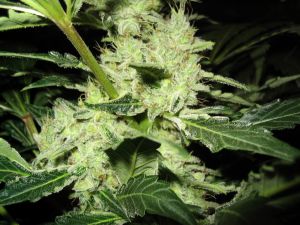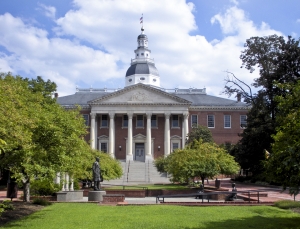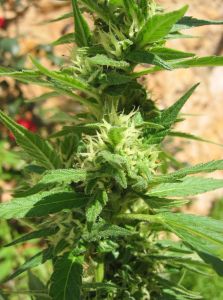 Supporters in the fight to bring legal medical marijuana to Maryland received some uplifting news a few days ago from the governor’s office. While O’Malley did not actually come out and personally support legal use of the drug, he did give the go ahead for his health secretary to back the bill. During a hearing in Annapolis last Friday, secretary Sharfstein told lawmakers that the governor’s administration would now support medical marijuana legislation. The governor’s office did not address pending legislation for decriminalization and legalization of recreational marijuana use, but the health secretary’s statements did signal a reversal from the administration’s position on medical use this time last year.
Supporters in the fight to bring legal medical marijuana to Maryland received some uplifting news a few days ago from the governor’s office. While O’Malley did not actually come out and personally support legal use of the drug, he did give the go ahead for his health secretary to back the bill. During a hearing in Annapolis last Friday, secretary Sharfstein told lawmakers that the governor’s administration would now support medical marijuana legislation. The governor’s office did not address pending legislation for decriminalization and legalization of recreational marijuana use, but the health secretary’s statements did signal a reversal from the administration’s position on medical use this time last year.
In 2012 the medical use bills were defeated in the General Assembly due to concerns about state employees facing possible federal prosecution for developing and implementing a plan to dispense a drug that was, and is still is illegal under federal law. The actual likelihood of state employees being prosecuted by the feds was slim to none, and still remains a far-fetched scenario. Nonetheless, the governor’s office used this as an excuse to make sure the bill died, while at the same time assuring that medical use activists would be only the slightest bit offended. In essence this clever political play bought the governor an additional year to weigh the effects of serving as the executive of a state with legalized pot against his national political aspirations. After witnessing the groundbreaking popular votes in Colorado and Washington State, along with the continuing trend toward universal support of medical marijuana, it was an easy reversal for the governor.
Continue reading →
 Criminal Defense Lawyer Blog
Criminal Defense Lawyer Blog


 Those who have read most of our posts understand the blog’s position on the state marijuana laws. The medical use laws in Maryland do little to protect those who have an actual need for the drug because the users are not protected from being arrested or cited. On top of this, the statutory affirmative defense is always at the mercy of the presiding judge’s discretion, and there are simply too few judges that actually understand the medical benefits of marijuana. Call it ignorance or a generational gap, but whatever the reason the affirmative defense is rarely granted and offers little practical protection.
Those who have read most of our posts understand the blog’s position on the state marijuana laws. The medical use laws in Maryland do little to protect those who have an actual need for the drug because the users are not protected from being arrested or cited. On top of this, the statutory affirmative defense is always at the mercy of the presiding judge’s discretion, and there are simply too few judges that actually understand the medical benefits of marijuana. Call it ignorance or a generational gap, but whatever the reason the affirmative defense is rarely granted and offers little practical protection.  Marijuana legalization debates continue to ramp up on the floor of the state legislature, and the latest bill to be introduced is by far the most progressive to date. We previously posted an article about the introduction of Maryland Senate Bill 297, which dealt with the decriminalization of the popular drug. The most recent bill though takes Senator Zirkin’s proposal one step further, and calls for outright legalization of marijuana for recreational use. The new bill is nearly identical to the laws that were recently passed in Colorado and Washington. If passed into law, it would allow citizens over the age of 21 to possess one ounce or less of marijuana, and additionally to grow up to three plants in their homes. The current state law makes it illegal for anyone to possess even a residue amount of the plant, and violators face up to 90 days in jail for having 10 grams or less, and up to a year for possessing more than 10 grams.
Marijuana legalization debates continue to ramp up on the floor of the state legislature, and the latest bill to be introduced is by far the most progressive to date. We previously posted an article about the introduction of Maryland Senate Bill 297, which dealt with the decriminalization of the popular drug. The most recent bill though takes Senator Zirkin’s proposal one step further, and calls for outright legalization of marijuana for recreational use. The new bill is nearly identical to the laws that were recently passed in Colorado and Washington. If passed into law, it would allow citizens over the age of 21 to possess one ounce or less of marijuana, and additionally to grow up to three plants in their homes. The current state law makes it illegal for anyone to possess even a residue amount of the plant, and violators face up to 90 days in jail for having 10 grams or less, and up to a year for possessing more than 10 grams. We discussed in the last blog entry that state lawmakers were planning to introduce new legislation on medical and synthetic marijuana. These bills are still in the works, but the big news coming out of the state house is that a brand new marijuana decriminalization bill is scheduled for a debate today in Annapolis. Maryland Senate Bill 297, proposed by state senator Zirkin, would effectively reduce the punishment for simple possession of marijuana from a maximum 90 days in jail to a maximum $100 fine. In addition simple possession, which is defined as less than 10 grams of the drug, would no longer be part of the state criminal code. Much like a parking ticket, violators of the proposed law would only be subject to a civil fine and would not be at risk of jail time or a criminal conviction. The hearing was scheduled for debate this afternoon, and promises to feature spirited testimony from a variety of politicians, former law enforcement officers, and even economists.
We discussed in the last blog entry that state lawmakers were planning to introduce new legislation on medical and synthetic marijuana. These bills are still in the works, but the big news coming out of the state house is that a brand new marijuana decriminalization bill is scheduled for a debate today in Annapolis. Maryland Senate Bill 297, proposed by state senator Zirkin, would effectively reduce the punishment for simple possession of marijuana from a maximum 90 days in jail to a maximum $100 fine. In addition simple possession, which is defined as less than 10 grams of the drug, would no longer be part of the state criminal code. Much like a parking ticket, violators of the proposed law would only be subject to a civil fine and would not be at risk of jail time or a criminal conviction. The hearing was scheduled for debate this afternoon, and promises to feature spirited testimony from a variety of politicians, former law enforcement officers, and even economists. As we approach the midway point in this year’s legislative session in Annapolis, it should come as no surprise that marijuana is trending heavily on the floor. Representative Glenn of Baltimore planned to introduce the Maryland Medical Marijuana Act to the House Judiciary Committee. This is the same bill that lost steam during the legislative gauntlet last winter. The bill would allow the state’s Department of Health and Mental Hygiene to establish centers for marijuana distribution for patients with a medical necessity for the drug, provided they are under the continuous care of a doctor. Ms. Glenn is quoted as saying that “people are suffering everyday in the state of Maryland, and they are being subjected to going out on the streets for the relief we should be providing.” In addition to suffering unnecessary pain and anguish, medical marijuana users also face arrest and prosecution from State’s Attorneys and Judges who naively believe marijuana is a dangerous drug with no legitimate benefits. This type of archaic thinking is especially present in the more rural areas of the state, and in stricter jurisdictions such as Harford County and Worchester County.
As we approach the midway point in this year’s legislative session in Annapolis, it should come as no surprise that marijuana is trending heavily on the floor. Representative Glenn of Baltimore planned to introduce the Maryland Medical Marijuana Act to the House Judiciary Committee. This is the same bill that lost steam during the legislative gauntlet last winter. The bill would allow the state’s Department of Health and Mental Hygiene to establish centers for marijuana distribution for patients with a medical necessity for the drug, provided they are under the continuous care of a doctor. Ms. Glenn is quoted as saying that “people are suffering everyday in the state of Maryland, and they are being subjected to going out on the streets for the relief we should be providing.” In addition to suffering unnecessary pain and anguish, medical marijuana users also face arrest and prosecution from State’s Attorneys and Judges who naively believe marijuana is a dangerous drug with no legitimate benefits. This type of archaic thinking is especially present in the more rural areas of the state, and in stricter jurisdictions such as Harford County and Worchester County. Maryland lawmakers are set to begin the 2013 legislative session next week in Annapolis, and gun control is one topic on the minds of many representatives. State legislatures from all over the country will undoubtedly take a deep look into their respective gun laws following the Newtown, Connecticut tragedy, and Maryland is no exception. At least one representative, a democrat from Baltimore County, has already publically proposed a bill that would require active duty police officers to be deployed full time in all state public schools. There are currently school resources officers in many middle and high schools and a few elementary schools, but deploying these officers in public schools is not mandatory. School resource officers are sworn policemen and women that have arrest powers, and carry standard issue police firearms. The bill was submitted as emergency legislation, which means that if it passes it could go into effect as soon as February. It is obviously too early to tell if the bill will receive any opposition, but it seems as if the financial burden on local police jurisdictions would be the only obstacle to the bill’s passage.
Maryland lawmakers are set to begin the 2013 legislative session next week in Annapolis, and gun control is one topic on the minds of many representatives. State legislatures from all over the country will undoubtedly take a deep look into their respective gun laws following the Newtown, Connecticut tragedy, and Maryland is no exception. At least one representative, a democrat from Baltimore County, has already publically proposed a bill that would require active duty police officers to be deployed full time in all state public schools. There are currently school resources officers in many middle and high schools and a few elementary schools, but deploying these officers in public schools is not mandatory. School resource officers are sworn policemen and women that have arrest powers, and carry standard issue police firearms. The bill was submitted as emergency legislation, which means that if it passes it could go into effect as soon as February. It is obviously too early to tell if the bill will receive any opposition, but it seems as if the financial burden on local police jurisdictions would be the only obstacle to the bill’s passage. The war on prescription drug abuse has been effective in decreasing the availability of commonly abused pills such as oxycodone and other narcotics. But as an unintended consequence, heroin use in Maryland has actually been on the rise. More people are using heroin, and state officials are reporting a significant jump in the number of deaths attributed to heroin overdoses in 2012. In fact, in the first half of 2012 heroin related overdoses increased 41 percent, with 205 deaths reported from January to July of this year compared to 145 in 2011 over the same time frame. There could be a wide variety of reasons for the jump in overdoses, which according to state officials signals a definite jump in use of the drug, but the leading factor is likely a recent crackdown on pill mills.
The war on prescription drug abuse has been effective in decreasing the availability of commonly abused pills such as oxycodone and other narcotics. But as an unintended consequence, heroin use in Maryland has actually been on the rise. More people are using heroin, and state officials are reporting a significant jump in the number of deaths attributed to heroin overdoses in 2012. In fact, in the first half of 2012 heroin related overdoses increased 41 percent, with 205 deaths reported from January to July of this year compared to 145 in 2011 over the same time frame. There could be a wide variety of reasons for the jump in overdoses, which according to state officials signals a definite jump in use of the drug, but the leading factor is likely a recent crackdown on pill mills. The Maryland Legislature is scheduled to begin its 2013 legislative session next month, and marijuana is one issue that is sure to be hotly debated. Medical marijuana supporters and personal use advocates alike hope that this year’s session makes more progress in the fight for decriminalization. Toward the end of last year’s legislative session, the head of the state’s department of health went on record saying that he would not support decriminalization as long as federal law continued to define pot as an illegal controlled substance. The department head cited concerns that his state employees could be subject to federal prosecution under the controlled substances act and there would be nothing the state could do to protect them. The head of any state agency has a duty to protect his or her employees, but the broader issue is also that state lawmakers want to protect their constituents as well. It would certainly not look good for Annapolis if Maryland citizens were being prosecuted federally for following a law that their own delegates supported and eventually passed. But supporters of marijuana decriminalization have hope that this year will be different based on two influential votes on this past Election Day.
The Maryland Legislature is scheduled to begin its 2013 legislative session next month, and marijuana is one issue that is sure to be hotly debated. Medical marijuana supporters and personal use advocates alike hope that this year’s session makes more progress in the fight for decriminalization. Toward the end of last year’s legislative session, the head of the state’s department of health went on record saying that he would not support decriminalization as long as federal law continued to define pot as an illegal controlled substance. The department head cited concerns that his state employees could be subject to federal prosecution under the controlled substances act and there would be nothing the state could do to protect them. The head of any state agency has a duty to protect his or her employees, but the broader issue is also that state lawmakers want to protect their constituents as well. It would certainly not look good for Annapolis if Maryland citizens were being prosecuted federally for following a law that their own delegates supported and eventually passed. But supporters of marijuana decriminalization have hope that this year will be different based on two influential votes on this past Election Day. A variety of new Maryland laws are set to go into effect on Monday, October 1st. Many of these new Maryland laws are part to the criminal justice system, most notably the Maryland marijuana possession law. After years of lobbying by marijuana legalization groups, the Maryland state legislature finally voted to change the state’s harsh marijuana possession laws. Starting on Monday, the maximum penalty for simple possession of marijuana will be lowered from 1 year in jail to 90 days in jail, and the maximum fine will be lowered from $1,000 to $500. Simple possession of marijuana is possession of less than 10 grams of the controlled substance. Pressure from pro marijuana lobbyist groups was not the only reason that the legislature and governor agreed with the new marijuana penalties. The legislature was also swayed by proponents of a more streamlined judicial system.
A variety of new Maryland laws are set to go into effect on Monday, October 1st. Many of these new Maryland laws are part to the criminal justice system, most notably the Maryland marijuana possession law. After years of lobbying by marijuana legalization groups, the Maryland state legislature finally voted to change the state’s harsh marijuana possession laws. Starting on Monday, the maximum penalty for simple possession of marijuana will be lowered from 1 year in jail to 90 days in jail, and the maximum fine will be lowered from $1,000 to $500. Simple possession of marijuana is possession of less than 10 grams of the controlled substance. Pressure from pro marijuana lobbyist groups was not the only reason that the legislature and governor agreed with the new marijuana penalties. The legislature was also swayed by proponents of a more streamlined judicial system.